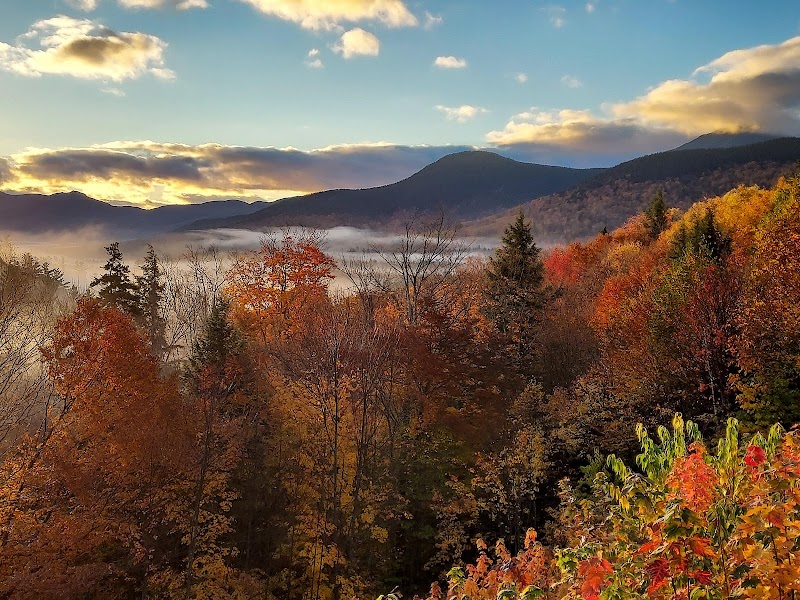
Wildflowers & Windswept Peaks: Hiking the Carters and Wildcats
Experience the rugged allure of New Hampshire’s Carters and Wildcat peaks where wildflowers bloom defiantly and winds shape every step. This trail blends invigorating elevation gains with breathtaking views, offering a practical and rewarding mountain adventure for hikers of all stripes.
Start Early for Best Conditions
Morning hours bring cooler temperatures, calmer winds, and fewer crowds, making your hike safer and more enjoyable.
Bring Adequate Water and Snacks
Carry at least two liters of water and high-energy snacks; reliable water sources are limited and intermittent along the trail.
Wear Sturdy Footwear with Good Traction
The trail surface varies from rocky rubble to packed earth, so supportive hiking boots will protect your ankles and reduce slip risk.
Dress in Layers to Handle Changing Weather
Temperatures drop near the summits and sudden weather shifts are common. Pack windproof and insulating layers to stay comfortable.
Wildflowers & Windswept Peaks: Hiking the Carters and Wildcats
The Carters and Wildcats offer a compelling duo of peaks that challenge and refresh hikers ready to engage with New Hampshire’s raw mountain spirit. Starting from the trailhead near Crawford Notch, this roughly 6.5-mile out-and-back traverse demands a steady rhythm and clear focus. Elevation gain hits around 1,900 feet, pushing you through dense fir forests that whisper with the wind’s persistence, before bursting open onto ridges where winds command the landscape like an untamed sculptor.
Early summer unveils the trail’s floral personality—wildflowers spread across meadows, offering a vibrant contrast to the granite slabs and windswept heathlands. These plants are not passive background; they defy the rugged environment with bursts of color that dare you to slow down and appreciate their fleeting season.
The hike itself is a practical adventure: expect rocky, sometimes uneven footing that calls for sturdy boots with good ankle support and traction. The route works through changing terrain—from shaded woodlands that cool your pace to exposed summit ledges where the air rushes in stubborn gusts. Bringing layered clothing is vital; the peaks hold the chill longer than the forested base, and sudden weather shifts are a norm, not a surprise.
Hydration must be intentional here. While streams lie hidden in shaded hollows, they are not guaranteed year-round, especially in late summer and fall. A minimum of two liters per person is recommended, alongside lightweight snacks to sustain energy as you push upward.
Planning your start time to catch the morning calm enhances both the solitude and the clarity of views. The Catskills can be a popular destination on weekends, so weekday mornings or late afternoon visits are ideal for those seeking quiet.
At the summit of Wildcat, a panoramic canvas unfolds—mountains stretch toward the horizon with Mount Washington’s jagged crown dominating nearby. This interaction with the elements feels less like mastering the trail and more like joining a force that’s fiercely itself. Each gust encourages you to stand steady, to respect the peaks’ sheer personality.
Descending demands as much care as climbing; the loose rock and variable terrain test your balance, and the trail’s firmness underfoot evolves from gravel to packed earth in sections. Keep your pace measured—rushing invites slips.
Whether you’re a seasoned adventurer or a weekend trekker, the Carters and Wildcats offer a practical yet thrilling encounter with nature’s untamed character. Prepare well, respect the peaks’ moods, and you’ll return with not just stunning views but a clear sense of accomplishment built on interaction, not dominance.
Nearby Trips
All Adventures
Boat Charters
Water Activities
Adventures near North Conway, New Hampshire
Discover the unique and memorable adventures that make North Conway, New Hampshire special.
Frequently Asked Questions
What is the best time of day to start the hike?
Early morning is ideal to avoid afternoon winds and potential storms. Starting before sunrise in warmer months lets you enjoy calmer, cooler conditions and clear views.
Are the Carters and Wildcat peaks family-friendly hikes?
While adventurous and rewarding, the trail’s rocky and steep sections may be challenging for young children or beginners. Older, fit children with hiking experience can manage with supervision.
Is there cell phone reception on the trail?
Reception is spotty and often limited as you ascend. It’s best to prepare without reliance on mobile devices and inform someone of your plans before you leave.
Can the trail be done as a loop?
Primarily an out-and-back route, the Carters and Wildcats trail does not offer a continuous loop. Expect to retrace your steps or plan a shuttle for alternative transportation.
What wildlife might I encounter?
Look for white-tailed deer, black bears from a distance, and various songbirds. Early risers might see chipmunks and squirrels actively foraging along the path.
Are dogs allowed on the trail?
Dogs are permitted but must be kept on a leash due to local wildlife and preservation policies. Bring water and clean up after your pet to help protect the environment.
Recommended Gear
Sturdy Hiking Boots
Provides ankle support and grip on rocky, uneven terrain essential for safety during ascent and descent.
Layered Clothing
Allows adaptation to drastically shifting temperatures and wind exposure at varying elevations.
Hydration System
Carrying enough water, ideally two liters or more, is critical as reliable sources are rare on this route.
Trekking Poles
Helpful for stability on uneven footing, particularly when descending loose or slippery sections.
Local Insights
Hidden Gems
- "A quiet rock outcrop halfway up the Carter-Moriah ridge provides a seldom-used resting spot with unexpected views."
- "Small pools near the base host delicate marsh marigolds in early spring."
Wildlife
- "Black bear sightings are rare but possible; always make noise while hiking to alert and avoid startling them."
- "Look out for New England cottontails scurrying through the underbrush."
History
"The Carters and Wildcats sit along routes once used by early settlers and logging crews, whose remnants remain visible in old stone walls and foundations near the trailhead."
